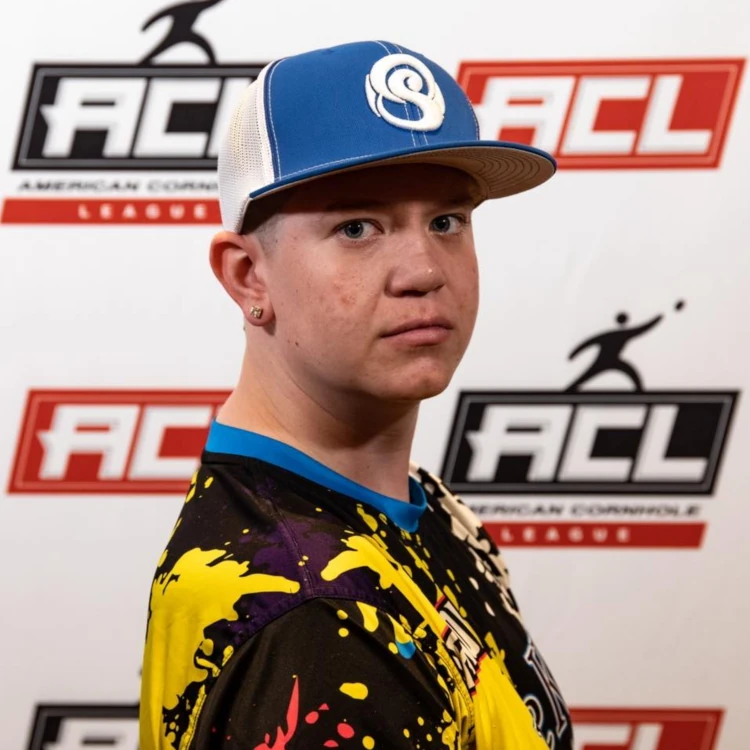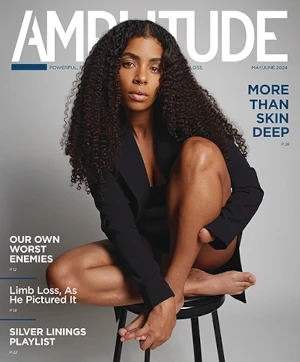
Cornhole isn’t the most physically demanding sport. There’s no speed or strength involved; you just have to lob a small beanbag about 30 feet, aiming for a 6-inch-wide hole. But when you’re a quadruple amputee, as Dayton Webber is, each toss is a full-body athletic endeavor.
“If I pinch the bag on the corner between my two arms, throw myself forward, and extend my arms, it gives me the leverage to be able to get the bag there,” says Webber, the only player with a disability in the professional American Cornhole League (ACL). “I do exert a lot of energy on my body and absorb a lot of impact every time I land. But if I didn’t jump, I wouldn’t get it there. If I didn’t grab the bag by the corner and catapult forward, I wouldn’t get it there.”
Even with the extra exertion, the 25-year-old Webber (who lost his limbs as an infant) demonstrates the elite hand-eye coordination, steady nerves, and strategic chops necessary to compete with the nation’s best cornhole players. He has won two Maryland state titles against able-bodied challengers, he’s qualified for the World Cornhole Championships, and he has spent two years on the ACL circuit—including his first nationally televised match this summer on ESPN.
“That was my biggest game ever,” Webber says. “Even bigger than when I won the state championship.”
Like most professionals, Webber learned the game at backyard barbecues and other informal settings. He started getting competitive as a teenager, entering open-draw tournaments in his native Maryland. “I’d play every single night of the week,” he says, and he won often enough to pocket some pretty good cash.
But the biggest reward for Webber wasn’t the prize money. It was the camaraderie. Fellow competitors befriended Webber, took his game seriously, and helped him develop the advanced shots and gamesmanship that distinguish professional players from local tournament champs.
“This is the greatest community to get out there and socialize with,” Webber says. “They are extremely welcoming.” People with disabilities routinely participate in open tournaments, he adds. “I’ve come across quite a few people a big events. People with one leg come out and play on their prosthesis or on crutches. People play from their wheelchairs. Whatever kind of disability you might have, you can learn to throw.”
And you don’t need to have professional ambitions to enjoy the game. Because it’s so accessible, Webber thinks cornhole is a great outlet for amputees who are looking for ways to stay socially active and have fun in a judgment-free setting. You can acquire a regulation cornhole board for less than $100 and get started in your backyard. If and when you’re ready to test your skills in competition, open-draw events and recreational leagues are extremely common.
“I have this saying: ‘The world won’t wait,’” Webber says. “It’s gonna keep spinning no matter what you do, so you have to stay active, stay in motion, and try to accomplish something every single day. I’m here to support anybody with a disability who wants to get involved in this game.”
If you want to contact Webber directly, message him on Facebook, TikTok, or Instagram @daytonwebber.
Find a Cornhole Tournament Near You
AMERICAN CORNHOLE ASSOCIATION: playcornhole.org
CORNHOLE FINDER: cornholefinder.com
SCOREHOLIO: scoreholio.com/cornhole
AMERICAN CORNHOLE LEAGUE: iplaycornhole.com/events




